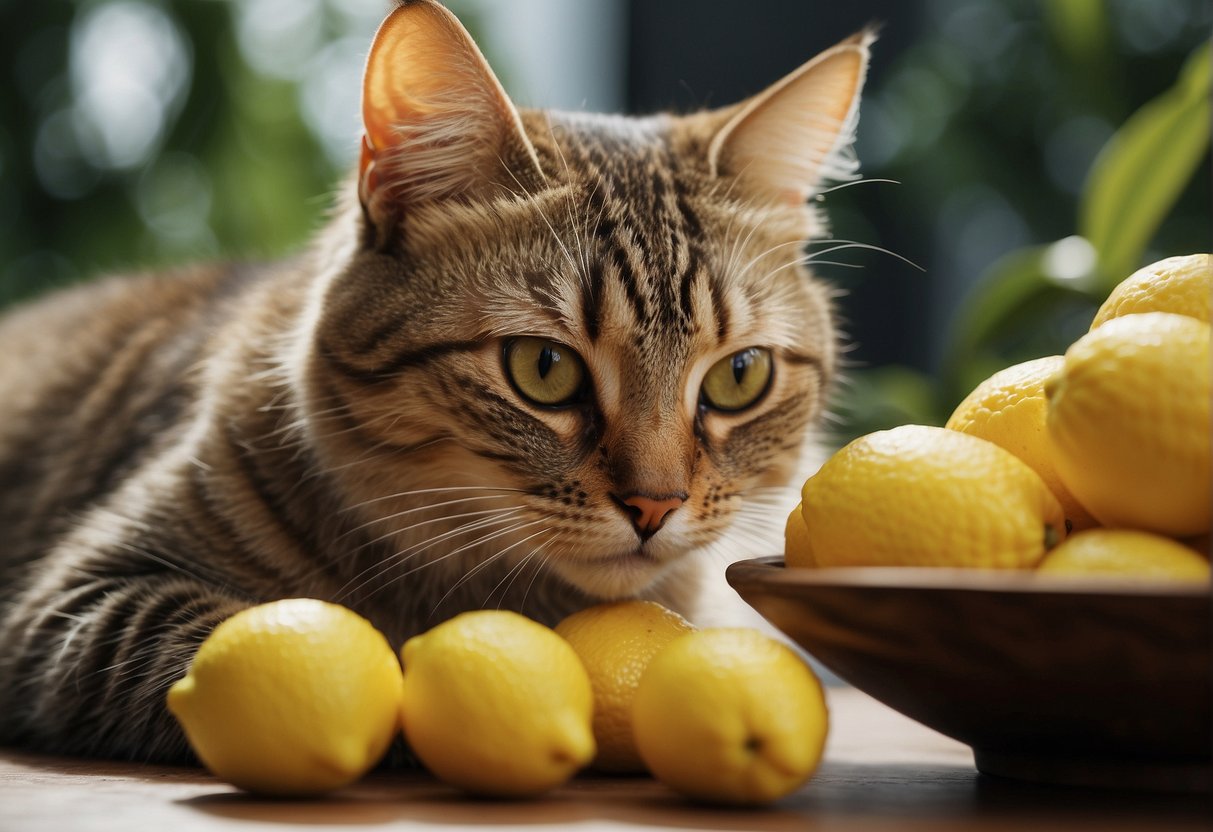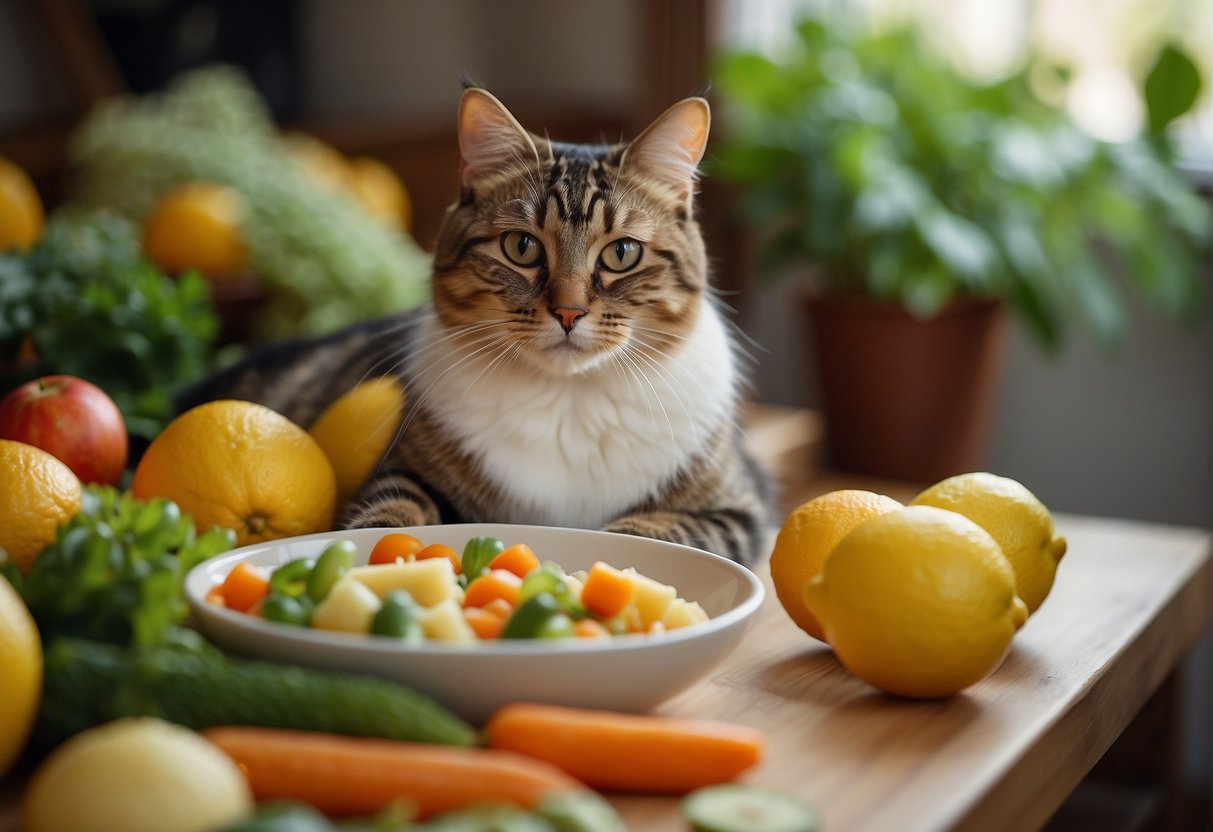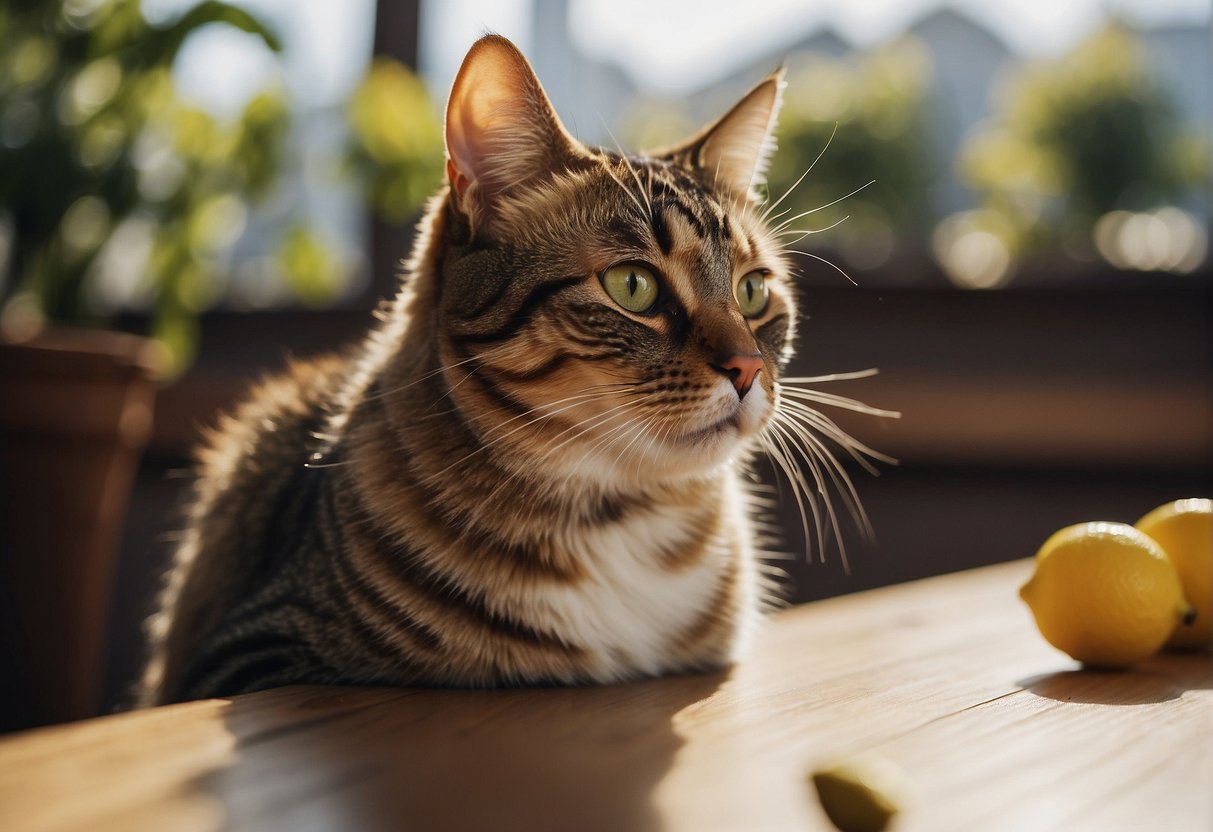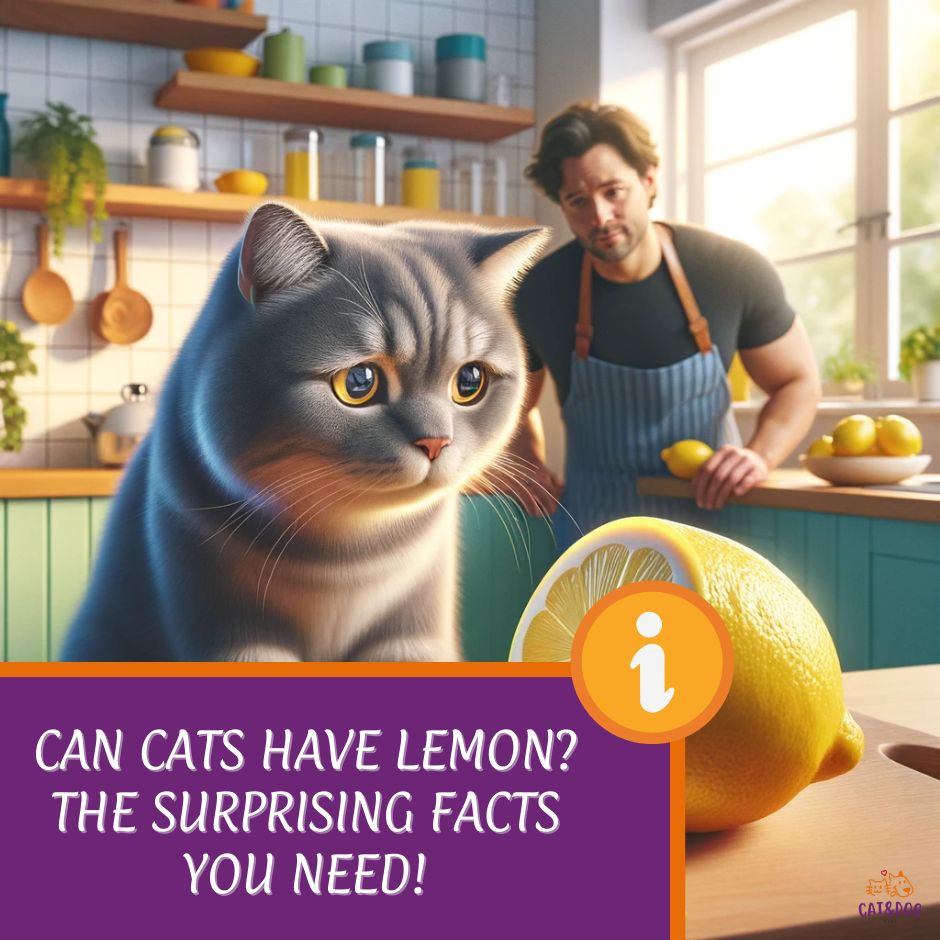Curiosity might kill the cat, but so could lemons! As a cat owner, it is important to prioritize the safety of your feline friend.
We’ve all been there, you’re enjoying a zesty snack, and your feline friend is eyeing up a piece of lemon with intrigue.
You might wonder, “Could a tiny slice be harmful?” The answer is clear: Yes, cats cannot have lemon or cat owner food.
As tempting as it may be to share your favorite foods with your furry companion, their safety comes first.

Understanding what food cats can and can’t eat is crucial for their well-being. You’re not alone in your concern; many fellow pet owners query about the safety of various human foods for cats.
Lemons, with their high citric acidity, essential oils, and psoralens, have been unequivocally marked as toxic to cats.
These substances can cause gastrointestinal issues at best and may lead to more serious conditions, such as lemon poisoning, when ingested in larger amounts.
As claimed by ASPCA, lemon is dangerous both for cats and dogs and can cause their death if ingested in large amounts.
The threat comes from high lemon acidity in combination with psoralen and limonene, toxins that can cause huge gastrointestinal distress.
Limonene, a key component found in lemon oil, is responsible for the fruit’s pungent smell.
While this is commonly used in cleaning products and even some animal shampoos and treatments, it is considered toxic to cats.
Key Takeaways
- Lemons are toxic to cats and should never be offered as a treat.
- Even small amounts of lemon can lead to health issues such as gastrointestinal upset in cats.
- Preventing your cat’s access to lemons and seeking immediate veterinary care if ingested is crucial.
Understanding Lemon Toxicity in Cats
Lemons contain compounds like limonene, linalool, and psoralens, which are toxic to cats. Let’s break down the facts:
The Science Behind Lemon Toxicity
- Limonene & Linalool:
These are found in the lemon’s skin and can cause digestive upsets and potential liver damage. (1) - Psoralens:
When paired with sunlight, this can lead to photosensitivity, causing skin problems. (2)
So, what happens inside your cat’s body? While you’re happily digesting your zesty treat, your cat’s liver works overtime.
Cats lack certain liver enzymes, making these compounds harmful to them, possibly leading to a range of health issues.
Identifying Symptoms of Lemon Poisoning Your curious cat sneaks a bite of lemon—what now? Keep an eye out for:
- Vomiting
- Diarrhea
- Lethargy (3)
Imagine your cat, Fluffy, gets into a lemon you accidentally left out. She might start drooling or show signs of weakness. In this hypothetical scenario, Fluffy would need immediate veterinary attention.
The vet might treat her with fluids or activated charcoal, focusing on supportive care until those toxic compounds are out of her system.
If you catch your cat eating a lemon, bring them to the vet right away.
Take the lemon with you as well, as it can help your vet in assessing the severity of the poisoning, making a diagnosis, and prescribing the most appropriate treatment.
If your regular vet does not offer after-hours services, bring your cat to an emergency clinic or call the Pet Poison Helpline, which is open 24 hours a day, 7 days a week.
Remember, your cat’s well-being is key. When life gives you lemons, enjoy them—but keep them away from your kitty.
Just stick to cat-friendly treats, and both you and your furball can stay happy and healthy.
Cats’ Behavioral Response to Citrus Scents
Why do our feline friends seem to turn up their noses at the smell of citrus?
Well, have you ever noticed your cat making a face or briskly walking away when they catch a whiff of something lemony?
It turns out, their response is quite natural. Cats have a robust sense of smell that is much more sensitive than ours—about 14 times as keen!
This means that odors like lemon can be downright overwhelming to their sniffers.
The reaction your kitty has is more than just a funny face; it’s deeply rooted in their survival instincts.
For cats, strong scents like those from citrus fruits can signal danger or an unnatural presence in their environment, leading them to steer clear.
The compounds in citrus scents, especially lemon, can be irritating to them. This may be why your cat darts out of the kitchen when you’re zesting a lemon for that homemade pie.
Now, is there a silver lining to this citrus cloud? Actually, yes! You can use this knowledge to your advantage.
If there are areas in your home you’d prefer to keep cat-free, a natural citrus spray could do the trick. Just use a diluted solution to avoid any potential irritation:
- 1 cup water
- 10-15 drops of citrus essential oil (lemon or orange)
Remember to apply it to places you want to deter your cat from, like the corners of your new sofa or the Christmas tree you don’t want turned into a cat playground.
But be mindful, it’s essential to use such deterrents carefully and sparingly to maintain the trust and comfort of your feline buddy.
Safe Dietary Practices for Cats

Citrus fruits like lemons are a no-go for your furry friend. They contain compounds that can cause gastrointestinal distress and more severe symptoms in cats.
So, what’s on the yes-list when you want to offer a treat from your fruit bowl?
One thing to keep in mind is that lemon trees, which are also toxic to cats, should be avoided by pet owners who are also lemon tree gardeners.
It is important to note that not all cats will be repelled by lemons and it’s better to be safe than sorry. Cat owners should keep lemons, and citrus oil products in particular, stored safely out of the cat’s reach.
Interesting fact:
Cats are primarily carnivores, meaning their bodies are tailor-made to digest meats, not plant materials.
Alternatives to Lemons and Citrus Fruits
While citrus fruits like lemons are not suitable, there are plenty of safe fruit snacks for cats that can be offered as occasional treats to keep their diet interesting and varied.
Let’s swap those citrus fruits for something that won’t furrow your kitty’s brows. Your feline can enjoy small pieces of melon or apple as an occasional treat. But remember:
- Melon: Full of water and vitamins A and C, melons can be a hydrating snack.
- Apple: Low in protein and fat, apples are also a source of vitamin C and fiber.
Here’s a tip: Always remove seeds and cores before serving these fruits to prevent any choking hazards or digestive issues.
Nutritional Advice for Feline Health
A balanced diet is the cornerstone of feline health. No need for a PhD to figure it out, just some basic rules:
- Protein power: Ensure a high-quality protein source is at the top of their menu.
- Fat facts: A moderate amount of fat is essential for energy and vitamin absorption.
- Carb caution: Keep carbohydrates on the lower side to match their carnivorous needs.
Consulting with a veterinary nutritionist can offer personalized advice tailored to your cat’s specific requirements, considering age, weight, and any health concerns.
Remember, balance is key, and treats should only make up a small portion of their overall intake.
So, next time you indulge in a citrusy treat, give your cat something they’ll both love and benefit from, meaty or safely fruity!
First Aid and Home Care for Lemon Ingestion

If you suspect your feline friend has nibbled on some lemon, don’t panic. Here’s how you can help:
Immediate Steps to Take at Home
- Remove Lemon: Gently take away any remaining pieces of lemon from your cat’s reach.
- Offer Water: Encourage your cat to drink fresh water to help dilute the citrus oils in their system.
- Observe Symptoms: Keep an eye out for unusual behaviors like drooling, vomiting, or lethargy.
Remember, your swift action can make a big difference!
Preparing for Emergency Situations
Having a pet first-aid kit ready can be a real lifesaver. Make sure it includes:
- Phone numbers: Your vet and the nearest emergency clinic.
- Gauze: To wrap wounds or muzzle your cat if necessary.
- Adhesive tape: For bandages (never use it on the fur).
- Cotton balls or swabs: To clean wounds or apply ointments.
- Ice pack: To reduce swelling or pain.
- Tweezers: To remove splinters or ticks.
- Disposable gloves: To keep your hands clean.
Assemble these items in a bag or box, so you’re always prepared. Cats can be sneaky, so better safe than sorry, right?
If you’re ever unsure about what to do, always call your vet for advice. They’re your go-to for ensuring your kitty’s health stays on track!
Preventing Accidental Ingestion of Lemons

Cats are naturally curious, so it’s crucial to ensure their playground doesn’t contain anything harmful—like lemons or any other citrus fruits.
Why not lemons, you ask? Simply put, the best way to keep your cat safe is to keep lemons out of their reach, especially on the dining table.
Lemons contain compounds that can wreak havoc on their little bodies.
Safe Storage of Lemons and Citrus Products
If life gives you lemons, store them wisely!
- Keep Them High:
Always store lemons and citrus products on high shelves or cabinets out of your cat’s acrobatic reach. - Cabinet Locks:
Consider child-proof locks for lower cabinets. If toddlers can’t get in, neither can your cat!
Creating a Safe Home Environment
In the game of cat versus lemon, always play defense.
- Food Watch:
Actively monitor what’s on your plates and countertops. Leftovers from last night’s lemon chicken? These need to go straight into the fridge. - Trash Talk:
A secure lid on the trash can is your secret weapon against lemon peel scavenging.
Remember, cats can’t tell the difference between a boring old apple and a toxic lemon. Ever seen a cat play goalie?
Neither have I, but they’ll sure try with anything that rolls off the counter.
Keep the citrusy stuff out of paw’s reach, and your four-legged housemate should be golden—or should I say, lemon-free!
Quick Recap

Here are the quick facts you need to know:
- No to Citrus:
Cats and citrus don’t mix. Lemons, like their citrus relatives, are a no-go for your kitty. - Beware the Compounds:
Lemons contain substances such as linalool, limonene, and psoralens that are harmful to cats.
| Substances in Lemons | Effects on Cats |
| Linalool | Toxic |
| Limonene | Can cause upset stomach |
| Psoralens | Skin sensitivity to sun |
- Don’t Ignore the Signs:
If your cat has a taste, they might show symptoms like diarrhea, vomiting, or worse. Not something you want to deal with, right?
Remember, you’re the guardian of your cat’s health:
- Keep lemons and any citrus fruits far from their reach.
- Even lemon scent or juice can be problematic. It’s all about safety first!
Ever noticed how cats turn their nose up at citrus smells? That’s their instincts steering them clear from danger.
And if you ever suspect your furball has snacked on some lemon, don’t wait—get in touch with your vet pronto.
It’s important to check with professionals instead of guessing when it comes to the health of your cuddly companion.
Now that you have answered the question can cats eat lemons?
You might be wondering if your dog is a different story, so read on to learn all about dogs and lemons. The good news is that cats usually avoid citrus smells, including lemon, and it is one of the dangerous food to cat.
However, if your cat insists on sampling your groceries, you’ll probably want to know what the specific issues are. Below, we’ll discuss what makes lemon and other citrus fruits a concern for our feline friends.
So, keep the lemons in your lemonade and away from your cat. They’ll thank you with purrs and cuddles, minus the sour faces!
Frequently Asked Questions
Lemons and cats are not a good mix, and it’s critical that you know why.
Let’s dive right into the specifics to ensure your feline friend stays safe and healthy.
Can cats have lemon?
No, you definitely can’t share your love for tart lemons with your cat. These citrus fruits are toxic to cats and should be kept far from their reach.
What Makes Lemons Toxic to Cats?
Lemons contain compounds like limonene, linalool, and psoralens, which are harmful to cats. Even the scent can be enough to cause discomfort.
How Much Lemon is Dangerous for a Cat?
Any amount of lemon can be harmful to cats. There is no safe threshold, as even a little lick can cause gastrointestinal upset.
Can Cats Have Lemon-Flavored Foods?
Steer clear of lemon-flavored foods for your kitty. The artificial flavors and citric acid might still cause issues, though not as severe as the fruit itself.
What Should I Do If My Cat Eats Lemon?
If your cat consumes lemon, contact your veterinarian immediately. Prompt action can mitigate the risk of poisoning.
Are Other Citrus Fruits Also Harmful to Cats?
Yes, all citrus fruits, including oranges, limes, and grapefruits, contain toxins similar to lemons and can harm your cat.
What Are the Signs of Lemon Poisoning in Cats?
Watch out for diarrhea, weakness, drooling, skin irritation, or more severe symptoms like tremors or low blood pressure, which suggest poisoning
- Free Online Casino Games: What You Need to Know - July 26, 2025
- Ideal Casinos Mobile: The Ultimate Guide to Mobile Betting - July 26, 2025
- The Ultimate Overview to Casino Site Gamings Online - July 26, 2025


